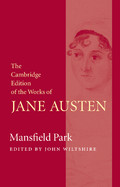Book contents
- Frontmatter
- Contents
- General Editor’s preface
- Acknowledgements
- Chronology
- Introduction
- Note on the text
- Volume I Mansfield Park
- Volume II Mansfield Park
- Volume III Mansfield Park
- Introductory note on Lovers’ Vows
- Lovers’ Vows
- Corrections and emendations to 1816 text
- Appendix: Commentary on the text
- Abbreviations
- Explanatory notes
Introductory note on Lovers’ Vows
Published online by Cambridge University Press: 18 December 2020
- Frontmatter
- Contents
- General Editor’s preface
- Acknowledgements
- Chronology
- Introduction
- Note on the text
- Volume I Mansfield Park
- Volume II Mansfield Park
- Volume III Mansfield Park
- Introductory note on Lovers’ Vows
- Lovers’ Vows
- Corrections and emendations to 1816 text
- Appendix: Commentary on the text
- Abbreviations
- Explanatory notes
Summary
Elizabeth Inchbald (1753–1821), actress, novelist, playwright and critic, has been described as the foremost English female dramatist. In a period when women playwrights began to consolidate their precarious position in the profession, Inchbald achieved conspicuous artistic and professional success. Between 1780 and 1805 she wrote twenty-one plays, nearly all comedies; ten of these were skilful adaptations from contemporary French or German works. She moved in London literary and bohemian circles, associating with the Kembles andWilliam Godwin among others.
In 1780, after eight years acting on provincial stages, Inchbald joined Thomas Harris’ company atCovent Garden, continuing to perform there and at other London theatres until her earnings from writing permitted her retirement from acting in 1789. Her novel A Simple Story appeared in 1791. The later part of her literary career involved overseeing andwriting biographical and critical prefaces for The British Theatre, a 25- volume collection of English plays published by Longman, making Inchbald the first woman professional drama critic in England.
Lovers’ Vows, freely adapted by Inchbald from August F. F. von Kotzebue's sentimental melodrama Das Kind der Liebe (1790), opened at the Theatre Royal, Covent Garden on 11 October 1798 and was performed there for forty-two nights over that season, a success instantly replicated at the other legitimate London playhouses and in the chief provincial theatres.Well received in public performance, the play soon became favourite material for private or amateur representation. Excerpts from Lovers’ Vows were published in magazines, often with illustrations: see for example European Magazine, 37 (April 1800), p. 302; Universal Magazine, 103 (December 1798), pp. 418–22; Lady’sMagazine, 30 (February 1799), pp. 53–5. The whole play was printed in twelve inexpensive editions by the end of 1799, and in 1805 it was anthologised with other of Inchbald's plays. It continued a staple of the English dramatic repertoire until well into the nineteenth century.
Robust critical debate over the moral and political tendencies of Lovers’ Vows accompanied its unqualified commercial success. Of particular concern, for reviewers who condemned the play, was its depiction of the lower-class characters, the Cottagers and Anhalt, as more pious and upright than the aristocrats Count Cassel and Baron Wildenhaim, both of whomare seducers of poor young women, Cassel unapologetically.
- Type
- Chapter
- Information
- Mansfield Park , pp. 549 - 554Publisher: Cambridge University PressPrint publication year: 2005

